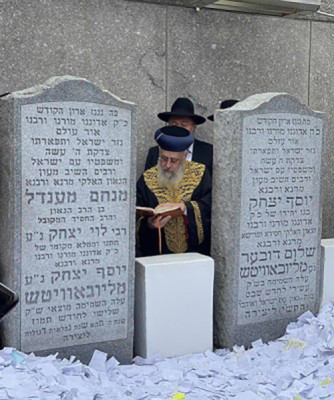
I. Hashkavah
The hashkavah prayer, which is recited in memory of the dead, is a plea to Hashem to have mercy on their souls and raise them to a higher spiritual plane.
Rav Aharon Berachia of Modina (17th Century Italy) writes in Ma'avar Yabok that Moshe Rabbeinu asked the Jews to “please remember me and mention my name when you enter the land of Israel (Midrash Tanchuma – Va’etchanan). From this, we learn that it is a great merit for the name of a deceased to be mentioned in any holy place and auspicious time.
Furthermore, it is important to have kavanah when mentioning the name of a deceased person after their death. This is because words have the power to elevate, and when we mention the name of a deceased person with respect and reverence, we can help to elevate their soul. This is especially true if the deceased is remembered by their children or close relatives or remembered in the synagogue where they used to pray. It is even more beneficial if the deceased built the synagogue or dedicated it for a holy purpose. All these actions can help the soul of the deceased to experience the joy that is revealed on holy days such as Shabbat or Yom Tov. Hashem grants the souls of the deceased rest and peace, especially when they are remembered by those who love them.
II. Source
The custom of praying for the deceased had evolved through many stages. It began with a pledge to make a charitable donation on behalf of the departed-on Yom Kippur.
The Midrash (Tanchuma Chadash, Ha’azinu 1) teaches that giving charity on Yom Kippur on behalf of the deceased is a meritorious act. This is because “Yom HaKippurim” is a day of atonement,” and it atones for both the living and the deceased.
Rav Elazar of Worms (1176-1238) and Rav Yehudah HaChasid (1140-1217) wrote that on Yom Kippur there was a custom to pledge money to tzedakah on behalf of the deceased. Since Hashem judges both the living and the deceased on Yom Kippur, the charity pledged on behalf of the deceased on this day is considered as if the deceased would have given it themselves (if they were still alive and had the means to do so).
This is what was done on behalf of the deceased at that time, but it was limited to tzedakah, not to other acts.
In the 13th to 14th century, Rav Aharon HaKohen of Lunil explains that in addition to tzedakah (that is very powerful when we are dealing with atonement). One should recite a prayer along with the name of the deceased. This is known as the hashkavah or yizkor, that was recited on Yom Kippur.
Based on these Rishonim, the Rama (1520-1572) records the custom amongst the Ashkenazi Jewry to recite yizkor on Yom Kippur along with pledging charity on their behalf.
The custom of praying for the deceased was only on Yom Kippur, and there is no mention of Yizkor or collecting tzedakah on behalf of the deceased on other Yamim Tovim (holidays) or any other day for the deceased.
III. Other Holidays
Rav Mordechai Yoffe (1530-1612) in his Sefer Levush (Orach Chayim 490:9), writes that since we read about tzedakah on Yom Tov, it is appropriate to give tzedakah for the deceased so they can receive atonement. Thus, the Ashkenazi community also recites names of the deceased on other Yamim Tovim (holidays) besides Yom Kippur.
IV. On Shabbat
The Shibolei HaLeket, written by Rav Tzidkiyah HaRofeh (1210-1280) introduced the concept of saying hashkavah after the mashlim (final) aliyah on Shabbat. This is cited by the Bet Yosef (Orach Chayim 284) and codified by the Rama. Even though the Rama mentions only saying it once at the end of the Torah reading, today the minhag is to mention hashkavah even between the aliyot. Rav Ovadia Yosef writes that one can say it after a Torah lecture as well.
The reason why we recite hashkavah on Shabbat as opposed to any other time is that since Shabbat is likened to Olam HaBah, and Gehinom is closed for that day, it would be very beneficial (especially for the deceased that did not keep Shabbat) for the relatives to pledge tzedakah on behalf of the deceased and pray for them. Some also add (Mateh Moshe 458) that this way the deceased become our guarantors. It should be noted that this was only for names of deceased that are within 12 months of passing, or from the Shabbat before the yearly Yahrzeit (Piskei Teshuvot 284:14).
Thus, the hashkavah prayer we have today evolved through many stages. It initially started with tzedakah pledge on Yom Kippur in Ashkenazi community. Then it made its way from the Ashkenazic community to the Sephardic community.
V. How
The poskim point out that it is best if the children of the deceased recite the prayer. It can be recited privately, and no minyan is required.
When mentioning the name of a loved one for a hashkavah prayer one should make sure to pledge some amount to charity. Even though a prayer for the deceased was added, not to pledge or give tzedakah is not in compliance of the original minhag. (See further in the Rama)
By Rabbi Nissan Shalomayev,Rav, Bukharian Jewish Cong. of Hillcrest, Kehilat Ohr V'Achdut
History Of Hashkavah Prayer For The Deceased
Typography
- Smaller Small Medium Big Bigger
- Default Helvetica Segoe Georgia Times
- Reading Mode




